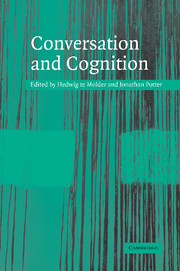Book contents
- Frontmatter
- Contents
- List of contributors
- Acknowledgements
- Transcription conventions
- 1 Talking cognition: mapping and making the terrain
- Part I The interface between cognition and action
- Part II Cognition in action
- 7 Is confusion a state of mind?
- 8 Cognition in discourse
- 9 From process to practice: language, interaction and ‘flashbulb’ memories
- 10 ‘My memory has been shredded’: a non-cognitivist investigation of ‘mental’ phenomena
- 11 Discursive psychology, mental states and descriptions
- References
- Index
8 - Cognition in discourse
Published online by Cambridge University Press: 22 September 2009
- Frontmatter
- Contents
- List of contributors
- Acknowledgements
- Transcription conventions
- 1 Talking cognition: mapping and making the terrain
- Part I The interface between cognition and action
- Part II Cognition in action
- 7 Is confusion a state of mind?
- 8 Cognition in discourse
- 9 From process to practice: language, interaction and ‘flashbulb’ memories
- 10 ‘My memory has been shredded’: a non-cognitivist investigation of ‘mental’ phenomena
- 11 Discursive psychology, mental states and descriptions
- References
- Index
Summary
Introduction
The objective of this chapter is to describe some of the ways in which the issue of cognitive process surfaces in talk as an explicit, or relatively explicit, matter that the participants are dealing with in the talk itself. I will begin with some brief comments on how participants represent cognitive process in their descriptions of everyday experiences and events. Subsequently I will look at the embodiment of cognitive process in interaction, focusing on the response particle oh, which is virtually specialized to the task of this embodiment. I will conclude with some basic observations about the treatment of cognition in the domain of ordinary interaction.
Portraying cognitive process
While attention, cognition and memory are central topics of psychology, they can also be matters of significant concern in the way events are portrayed by those who report them. Representations of cognition, and especially of cognitive process, are commonly driven by a desire to evidence the normality and reasonableness of the objects of cognition (Garfinkel, 1967; Sacks, 1984; Jefferson, forthcoming).
Consider the following interaction in which a mother is presenting her eleven-year-old daughter's upper respiratory symptoms to a paediatrician. The time is Monday afternoon and the daughter has not attended school.
Information
- Type
- Chapter
- Information
- Conversation and Cognition , pp. 184 - 202Publisher: Cambridge University PressPrint publication year: 2005
Accessibility standard: Unknown
Why this information is here
This section outlines the accessibility features of this content - including support for screen readers, full keyboard navigation and high-contrast display options. This may not be relevant for you.Accessibility Information
- 73
- Cited by
